How Media Fakery Is Targeting Kosovo’s Specialist Chambers
Stolen journalism, fabricated witnesses, and Russian-backed narratives: How a coordinated disinformation machine is working to derail war crimes prosecutions at Kosovo’s Hague-based court.
In the bitter struggle to safeguard Kosovo’s nascent justice institutions, a new front has emerged: the weaponisation of media fakery. At the heart of this emerging operation is a relatively obscure but increasingly toxic figure — a man whose name might barely register outside social media circles, yet whose activities reflect a broader, calculated effort to distort reality and weaken accountability for war crimes in Kosovo. His name is Fitim Çeku.
Mr Çeku presents himself as a journalist, a bearer of supposed ‘exclusives’ on social platforms, but closer scrutiny reveals an alarming portrait of manipulation, falsehood, and theft. His latest act, a brazen attempt to pass off original investigative findings1 by The Gunpowder Chronicles as his own, marks a new low in this ongoing information war.
On 29 May 2025, Mr Çeku posted a supposed “exclusive” to his Facebook page2, featuring images of a clandestine 2020 meeting in Zurich between the disgraced operative Halit Sahitaj and Russian oligarch Igor Vladislavovich. What his audience was not told is that these images and the detailed context surrounding them, had been painstakingly gathered and published weeks earlier by The Gunpowder Chronicles as part of a multi-month investigation into a vast transnational plot to sabotage Kosovo’s Specialist Chambers at The Hague. The photographs were lifted directly from our April 2025 report, stripped of attribution, reframed with distortions, and used to muddy the waters of public understanding.
Excerpts from the Misappropriated Material, Screenshots Below
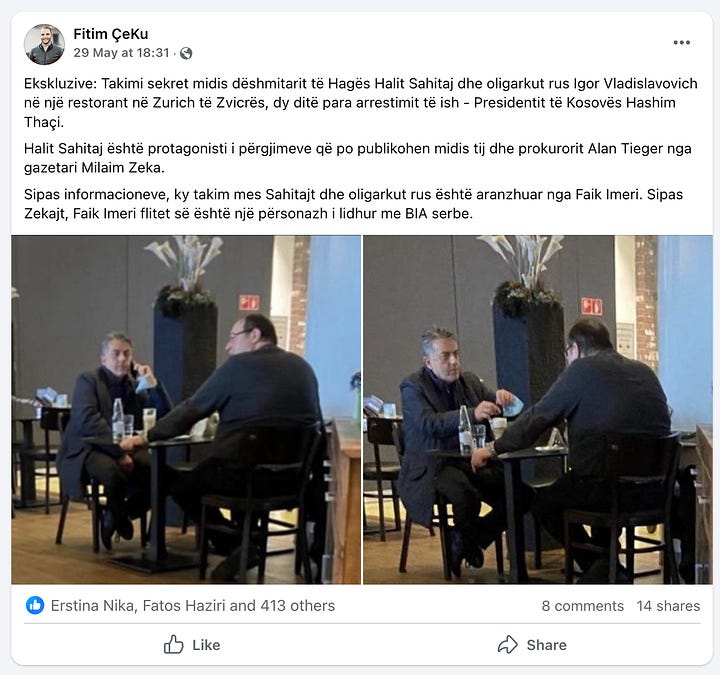
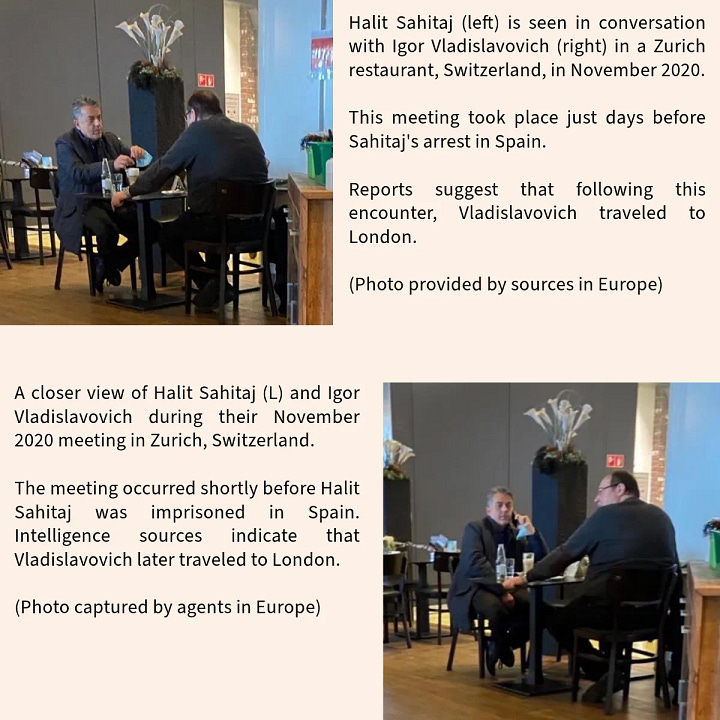
This act of intellectual theft is not merely unethical; it is dangerous. It forms part of a calculated strategy by a disinformation network to erode public trust in legitimate investigative journalism and, by extension, to blunt the ongoing efforts to hold Kosovo’s former warlords and their enablers accountable for crimes committed during and after the war.
The Gunpowder Chronicles has extensively documented this network3, which orbits around Milaim Zeka, a veteran media manipulator with deep ties to both criminal enterprises and Russian intelligence-linked figures. Mr Zeka himself has been the subject of numerous exposés involving fabricated evidence, blackmail schemes4, and even the sale of wartime footage to Serbian state media to fuel propaganda accusing the KLA of organ trafficking, allegations that have already been dismissed as unsubstantiated5. Despite this, Zeka has falsely claimed that the very court he maligns was founded by Serbia, when in fact it was established by Kosovo’s parliament in cooperation with the international community to deliver justice for victims of war crimes and political assassinations committed during and after the war in Kosovo. To this day, Zeka remains the chief architect of the current misinformation campaign targeting the Specialist Chambers.
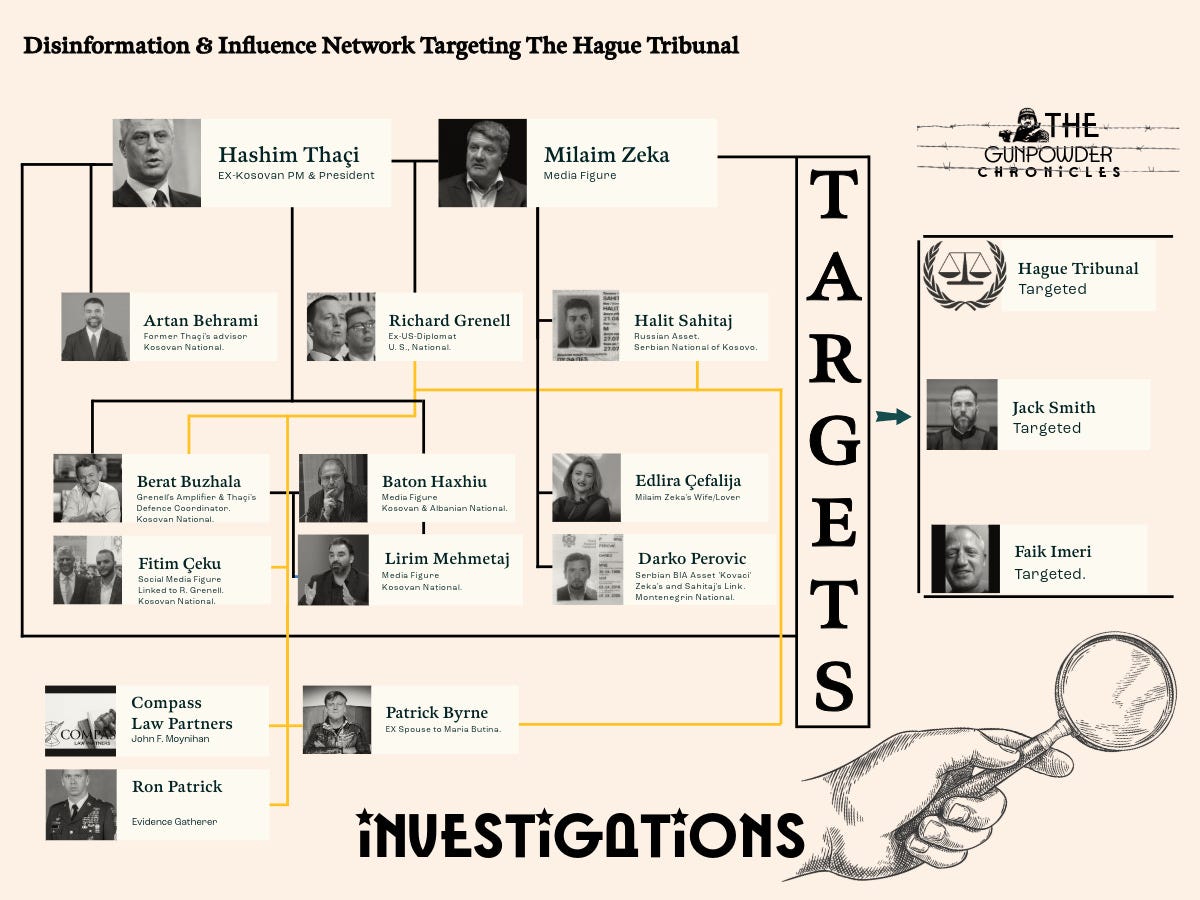
Mr Çeku, by comparison, has long been viewed as a peripheral player, an opportunist rather than a mastermind. But the brazen nature of his recent conduct suggests that his role is evolving. Though previously dismissed by investigators as too minor to warrant direct scrutiny, his latest stunt, disseminating stolen material in service of Zeka’s broader campaign, demonstrates his utility to the network as a pawn in their wider game of distortion.
The stakes are profound. Our investigation has uncovered that the Zeka-Sahitaj network, supported by foreign actors with links to Russian military intelligence (GRU), is waging an orchestrated campaign to delegitimise the Kosovo court, derail prosecutions, and rewrite the historical record of the war. Their methods are varied and insidious: the fabrication of witnesses, manipulation of evidence, dissemination of forged documents, and the systematic targeting of journalists who refuse to tow their narrative.
In this context, Mr Çeku’s theft of our Zurich photographs, accompanied by false claims and stripped of crucial investigative findings, is not a mere footnote. It is an act of deliberate sabotage aimed at confusing the public, undermining the credibility of legitimate journalism, and ultimately shielding figures like Halit Sahitaj from the accountability they so richly deserve.
Mr Sahitaj, as The Gunpowder Chronicles has documented in detail, is no innocent interlocutor. Our investigation, grounded in official documents, intelligence intercepts, and first-hand recordings, has exposed his central role in a sprawling criminal and intelligence nexus spanning Kosovo, Spain, Monaco, Switzerland, and Russia. Sahitaj is implicated in extortion, fraud, and active measures designed to distort proceedings at The Hague. His recent interactions with GRU-linked operatives were no coincidence but part of a deliberate effort to coordinate transnational influence operations.
Yet Mr Çeku, by recasting these encounters in an alternate light, detached from the investigative context, cleansed of their damning implications, and aligned with the counter-narratives peddled by Zeka and his associates, serves precisely the interests of those seeking to whitewash Sahitaj’s record and paralyse the court’s mandate.
This is a textbook tactic of disinformation: steal the real, distort its meaning, flood the public sphere with noise, and erode the capacity of citizens to discern fact from fiction. It is no accident that much of Mr Çeku’s online output, especially in recent months, is swiftly amplified by the very actors our investigations have exposed: chief among them, Milaim Zeka himself, whose own efforts to discredit the court have been backed by foreign political interests and discredited international operatives such as Richard Grenell.
The pattern is clear: disinformation actors in Kosovo are not content merely to spin falsehoods. Increasingly, they seek to hijack legitimate journalistic work, twisting verified reporting into weapons of confusion.
This is not journalism; it is sabotage masquerading as news.
In our investigation of Mr Zeka, we documented how he cultivated ties to disgraced former U.S. envoy Richard Grenell6, peddled fabricated lists of supposed war crimes indictees, and orchestrated witness manipulation efforts with direct Russian backing. His methods mirror those now being echoed by Mr Çeku’s more junior interventions.
The theft of our Zurich findings fits this pattern precisely: by inserting himself as a source of supposed ‘exclusive’ information, lifted from an investigation he did not conduct, stripped of its critical substance, Mr Çeku contributes to the same corrosive project: the discrediting of the Specialist Chambers, the shielding of criminal networks, and the deliberate manipulation of Kosovo’s fragile public discourse.
That Mr Çeku does so under the false banner of journalism is especially egregious. He has no verifiable record as a journalist, no credible editorial oversight, and no adherence to professional standards of fact-checking or attribution. His online persona functions not as a reporter but as a vector of distortion, a convenient amplifier for the narratives of those who fear accountability most.
The timing of his latest intervention is also instructive. The Zeka-Sahitaj network faces growing exposure. International law enforcement and intelligence agencies are now more aware than ever of the scale of this disinformation apparatus. And The Gunpowder Chronicles has pledged to continue publishing the next phases of its investigation, which will expose even deeper layers of foreign interference and local complicity.
Inside the Zeka–Çeku Amplification Loop
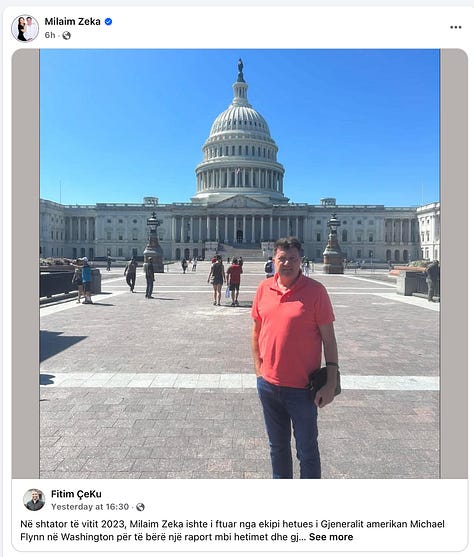
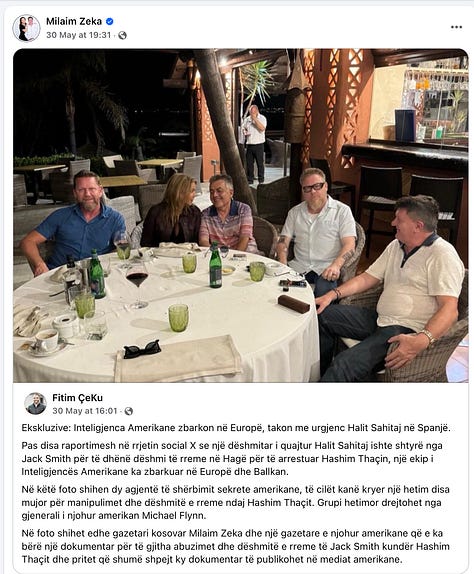
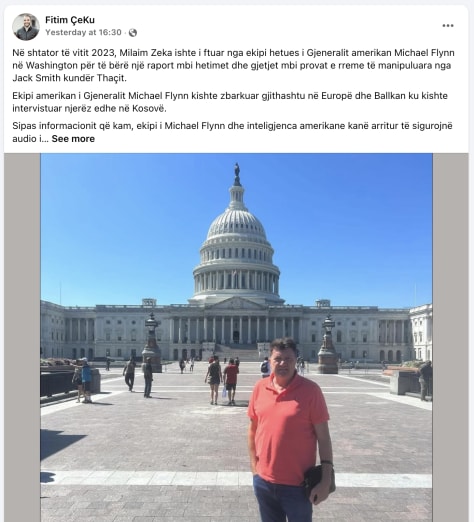
The symbiosis between Mr Çeku and Mr Zeka is neither incidental nor benign; it is a core mechanism of this disinformation ecosystem. As documented in the first screenshot, Mr Zeka frequently amplifies Mr Çeku’s posts, republishing his narratives to a broader audience and lending them a deceptive veneer of legitimacy. This is no casual interaction: it is a deliberate laundering of disinformation through multiple channels, creating an echo chamber that falsely suggests independent corroboration. The intent is clear, to cleanse Mr Zeka of the damning findings that The Gunpowder Chronicles has exposed regarding his role in evidence fabrication, blackmail, and collaboration with hostile intelligence actors. In the third screenshot, the pattern is further confirmed: Mr Zeka is once again seen republishing disinformation originally seeded by Mr Çeku, underscoring the coordinated nature of their operations. Equally revealing is the second screenshot, which captures a telling scene, Halit Sahitaj, third from both the left and right, seated comfortably at the same table with Mr Zeka, who appears first on the right. This image, corroborated by independent sources, directly contradicts the narrative that Mr Çeku now seeks to promote: namely, that Mr Sahitaj and Mr Zeka are peripheral figures, uninvolved in the malign influence operations uncovered by our investigation. Instead, Mr Çeku’s recent posts attempt to sanitise this association, presenting Mr Sahitaj as a wronged intermediary and Mr Zeka as a journalist pursuing noble inquiry. The photographic evidence, however, speaks otherwise, here is a moment of informal camaraderie between key players in the very network working to destabilise Kosovo’s justice process. It is yet another instance of narrative inversion: a concerted effort not only to muddy the public understanding of these relationships, but to shield those most implicated from the scrutiny their actions warrant.
Moreover, Mr Çeku’s methods betray a deliberate strategy of manipulation. A simple search reveals that he operates at least four separate Facebook profiles, each used to push variations of the same disinformation themes — targeting the Specialist Chambers, maligning international prosecutors, and recycling conspiratorial claims with no evidentiary basis. These multiple profiles enable him to amplify falsehoods across different audience segments, evade accountability when one account is challenged, and create the illusion of broader support for his narratives. The posts themselves, riddled with unverifiable claims about supposed U.S. investigations and sensationalist misrepresentations of the Kosovo Specialist Chambers, exhibit a calculated disregard for truth. Far from acting in good faith, Mr Çeku’s online activity serves as a textbook example of coordinated disinformation laundering in the digital public sphere.
How Mr Çeku Spreads Disinformation:

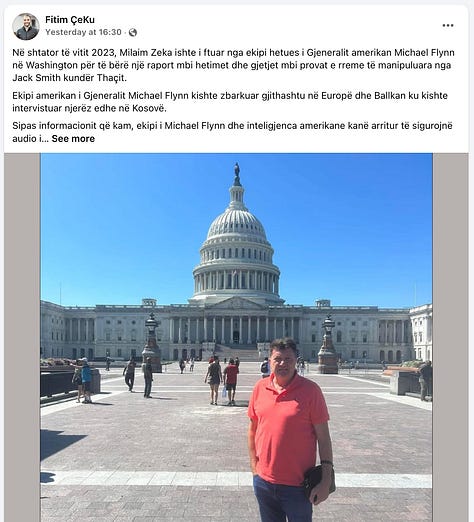
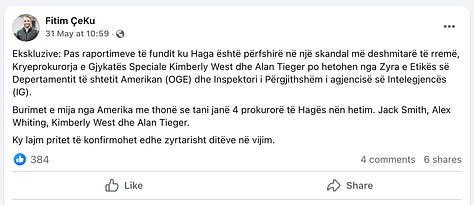
In this climate, actors like Mr Çeku are deployed to create noise, to confuse the public, to claim false credit, and to distort the reality of what investigative journalists and honest prosecutors are uncovering. It is a desperate tactic. But if left unchecked, it risks poisoning the public sphere, emboldening criminals, and eroding trust in the very institutions that Kosovo’s people deserve.
This is why it is imperative to call out such behaviour for what it is: not harmless opportunism, but a deliberate act of sabotage against the pursuit of justice.
The Gunpowder Chronicles stands by the integrity of its reporting. Our findings are fully sourced, rigorously verified, and transparently documented. We will not be deterred by attempts to plagiarise or distort them. Nor will we be silenced by the predictable smear campaigns that such exposure tends to provoke.
Kosovo’s citizens, and the international community, deserve clarity on who is manipulating the public sphere and why. They deserve to know that behind the opportunistic antics of figures like Mr Çeku lies a far more sinister project, one coordinated by seasoned disinformation operatives, backed by foreign intelligence, and aimed squarely at dismantling the hard-won progress of Kosovo’s justice system.
That is the story we will continue to tell. And no amount of theft or distortion will change it.
Inside the Disinformation Machine
From Crime to Covert Operations: The Rise of Halit Sahitaj in Targeting Kosovo's Special Chambers Tribunal. The GPC I Unit traced the Criminal Turned Operative's Path in Disinformation Warfare. — THE GPC I Unit.
The Conspiracy Against Kosovo's Justice System Unraveled
In response to manipulated attacks, we're granting free access to our latest investigative report, ensuring every reader sees the unfiltered truth. — The GPC I Unit.
Double Dealing: A Journalist, a Fixer, and a Master of Manipulation
Unveiling Milaim Zeka’s role in manipulating Kosovo's narrative, targeting the KSC in The Hague with a campaign of disinformation and deceit utilising Russian secret service assets and criminal ties. — The GPC I Unit.
ICTY press briefing (April 16, 2008) – ICTY confirms no evidence was ever brought before its judges on organ-trafficking allegations — ICTY.
EU Special Investigative Task Force press statement (July 29, 2014) – Lead investigator Clint Williamson finds insufficient evidence to issue any organ-trafficking indictments, noting only limited incidents occurred — Reuters.
Is Grenell Engineering Another Political Coup?
From diplomacy to disinformation, Grenell resurfaces, fuelling chaos in Kosovo’s elections with the same tactics that toppled Kurti’s government in 2020. — The GPC I Unit.



Rrofsh o Vudi, vetëm vazhdo rrugën e drejtë në të cilën je...
Best of luck in further unravelling of the 'noise polluting' capture of media space by so called Kosovan journalists and opinionists like Milaim Zeka, Berat Buzhala, Baton Haxhiu, Lirim Mehmetaj, Ilir Mirena, Valon Syla, Ilir Kajtazi, Halil Matoshi, Dugagjin Gorani, Dardan Gashi, Gani Paçarizi and their cohorts that are unfortunately too many to list all here...
You are doing a great service to the truth and justice, keep going, keep going, keep going...